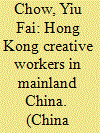|
|
|
Sort Order |
|
|
|
Items / Page
|
|
|
|
|
|
|
| Srl | Item |
| 1 |
ID:
182977


|
|
|
|
|
| Summary/Abstract |
A virus is not only invisible; it is also inaudible. Alongside attempts to visualize COVID-19, this article inserts a sonic perspective to listen to encounters between authorities and populations during the pandemic in China. The article examines how sound (mal)functions to mediate, interpellate, and distribute authority and power in the name of national health and safety. We will concentrate on the use of sirens and loudspeakers. First, at 10 a.m. on 4 April 2020, sirens were sounded throughout the nation to mark an official National Day of Mourning (全民哀悼日). Second, to reach places not readily accessible by more modern means of communication, rural leaders resorted to loudspeakers to announce virus-related messages to offline populations. Our curiosity about the sonic element was piqued. At the same time, we were reminded of ocularcentrism – the tendency or the bias to place the visual at the centre of inquiry. We argue for the need to engage with sonic practices and politics, and to foreground sound as a tool of governmentality. We want to document how certain instances of sonic governmentality played out in China during the pandemic. Finally, this inquiry should help us explore possible avenues for future research on sound and politics.
|
|
|
|
|
|
|
|
|
|
|
|
|
|
|
|
| 2 |
ID:
151966


|
|
|
|
|
| Summary/Abstract |
China took up the discourses and agenda of creative industries increasingly in the first post-millennium decade. Amidst the attempt to turn from ‘made in China’ to ‘created in China’, would the translation of the creativity discourse usher in a better society in China? This article serves as one of the probing steps to ascertain what creativity enables and disables in China. I do so in an inquiry that departs from existing scholarship on two aspects. First, it follows a regional, cross-border labour flow. Second, it focuses on the people in the frontline of creative work. My study draws on the experiences of 12 Hong Kong creative workers who moved to Shanghai and Beijing. Their translocal and transcultural encounters allowed me to trace and foreground the particularities of creative practices in China. Like many fellow creative workers, my informants moved north to pursue better career opportunities. But they also wanted to do something more. Some of them managed to do so. At the same time, their stories were punctuated with disappointments, frustrations and continuous adjustments, categorized into what I call the precarious and the ethical. The findings of this inquiry pose questions on the hypothesis, the hype and the hope of creativity in China.
|
|
|
|
|
|
|
|
|
|
|
|
|
|
|
|
|
|
|
|
|